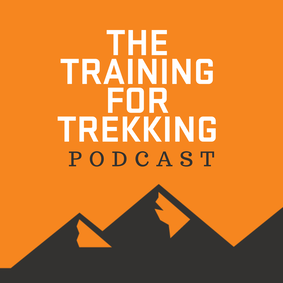|
In episode number two, of our twenty episode mini-series, I explore the statement of 'you get out what you put in' and how it related to my own training journey, but also its relevance for any hiker training towards a big goal.
EPISODE TRANSCIPT Introduction to the 20-week training mini-series [0:00] Hello, hello, ladies and gentlemen. So in today's episode, we're going through episode number two of this mini series around 20 lessons through 20 weeks of training. And essentially this mini series is all about 20 lessons that I learned and I experienced being a coach in a different training program, which I think has massive, massive, massive relevance into the world of training for hiking and training for adventure. Importance of putting effort into training for hiking and adventure [0:24] So with that being said, episode number two is all about you get out what you put in. [0:32] Now, where this comes from is basically at the start of that training process I went through, 20 weeks. It's 20 weeks, five mornings a week, getting in the gym, 5 a.m., doing the sessions with the culmination of a big event at the end. The impact of effort on the coaching experience [0:46] Now, at the very, very start of the journey, when we're getting introduced to the coaches and everything like that, it was a really, really, really, really, really powerful statement that the coaching staff said. And essentially they said, you know what, this experience, it has the potential to change so many things about you, change your confidence, change your fitness, you know, culminate, you know, all of this cool stuff. And essentially they said, you know, this process is going to be tough. There's a lot to learn. It may be overwhelming at certain times. You may struggle, but essentially for this entire process, you are going to get out what you put in. They said, you know, if you turn up every day, if you work hard, if you ask questions, if you have a good attitude, if you turn up on time, your coaches are going to step up and do everything in their power to get you where you need to be. [1:38] However, they said, you know, if you do the bare minimum, if you're skipping sessions, if you're late, if you don't listen, if you're not engaged, you have a bad attitude or whatever it may be, if you're just doing that bare minimum, the coaches are also probably going to do the bare minimum for you. They said they'll get you to the end. They'll do that base level of training, that base level of instruction. [2:03] But that's probably really going to be it. You're going to get out what you put in. Now, for me, this really resonated with me. Because I was like, you know what? As you listened to the last podcast episode, that process was pretty important. And I was like, you know what? I'm here to give it my all. So, you know, for me, I turned up to all the sessions through the process. I made sure I was on time. I did some extra classes where I could get more face time with a coach, where I could learn things. I took notes. I asked questions. I worked on things I was struggling with in my own time. And in turn, my coaches stepped up. They gave me extra advice. They were in my corner. They helped me through tough things. They helped figure things out. You can just see them really, really, really, really engaged because I was putting in so much. They also did the same. Now, this was my personal experience as an athlete in this situation, because, you know, on the flip side, there were people who just weren't engaged. They would only turn up to four sessions in a week. They'd be late to sessions. They'd sort of like roll in and just wouldn't listen or whatever it may be. And yeah, the coaches helped them. They did what they were paid to do, but they weren't going that extra mile for them, which is absolutely fair enough. [3:11] Now this is my personal experience in as an athlete or a participant in this situation but in my professional experience it's exactly the same on the flip side of things you know for me i've been a personal trainer for over 10 years you know i've been working with hikers for over five or six years you know i've trained hundreds and hundreds and hundreds of clients um both general population hikers over the years i've done small group training where we've had 20 30 people in a room where i've trained probably thousands more i've had lots of friends who who have been trainers and heard stories of many, many, many more. And this all rings true in all of those environments. You get out what you put in. Now through Summit Strength, you know, we have a lot of people come on board and we do have a pretty thorough screening process around, you know, people can't just sign up on our website. We have proper conversations with people before we get them on board because we want people who are going to be engaged. But in all honesty, some people still come in, you know, they have, you know, their big intentions on the conversations we have. They're happy to get started, but they come into our programs, they really do the bare minimum, if that. [4:13] They're constantly skipping sessions. They just don't communicate. They're a bit, well, you can say that, but they have a bit of attitude. We don't actually meet face-to-face, but they're maybe a bit rude or a bit abrupt in their messages, whatever it may be. They just don't seem engaged at all. Now, in all honesty, from a professional side of things, these people are tough to coach. Honestly, when someone is giving the bare minimum effort. If that, they'll typically get the bare minimum from the coaches as well. The coaches will still do their job, but they're probably not going to go above and beyond for this person. Now, alternatively, people come through and embrace things. If they actively get involved, they not only do the bare minimum, but they ask questions, they do the check-ins, they do the sessions, they come to the extras, maybe the coaching call, the education, if they're on one of those packages, or whatever it may be. They come in with a good attitude. They're engaged in the process. Ultimately, these are the people who are not only going to get the best results for themselves personally, because all of that stuff is positive stuff, but they're going to get way more from the coach. It just compounds on itself. This is just a fact of life. [5:18] So for you listening to this podcast, if you're doing a coaching program, if you're working with a personal trainer, working with an online personal trainer, if you're going into a gym, if you're doing group exercise classes, if you're following a program or whatever it may be, just know you get out what you put in. If you're working with a personal trainer in the gym, if they ask you to do things outside of your sessions, do them. If they ask you to do two or three more sessions in a week. Do them. Report back. Tell them how it was. If they ask you to come into a gym 10 minutes earlier to warm up so you have more time to go through your session, do that. If you're doing group exercise classes, ask questions at the end of a session. Ask the coaches if you have anything running through your head. Give them a wave during the class. Ask them if they can advise you on an exercise or whatever it may be. Be engaged and they'll be more likely to be in turn engaged back. If you're just working through a bare bones program, maybe you don't have a huge amount of coaching support, but maybe every once in a while you get the opportunity to ask questions, use that opportunity. Or if you have coaching touch points, you're doing a program online and you get a check-in each week, do the check-ins and give relevant information, whatever the structure is. Setting Training Expectations with a Partner [6:36] The same thing could be said if you're doing it with a training partner, if you've just got a friend you're going to the gym with. If they're super keen to have a red hot crack at the start of the year and they say, hey, I'm going to be training three times a week, but if you want to train once a week with us, maybe we can fit that in. Awesome. Do that. Turn up on time. Come with a good attitude. You, but see what you can do outside of the sessions to fit other things in. So you can come into the sessions together and say, you know what? I did this. I did this. We bounce off each other, match that energy or whatever it may be. In any type of training process, you get out what you put in. Putting in the Right Effort for Training Success [7:09] So at the start of 2024, if you've got big goals ahead of you, if you're working with a professional, if you're working with a friend, or even if you're just doing your own thing, just ask yourself, how can I make sure I'm putting in the right effort? it? And how can I make sure I'm getting that back? A bit of food for thought, but for me, it was such a powerful thing. It was such an important thing. And I saw both sides of the thing personally. And then professionally, I see it every single day on both sides of the fact as well. Making a Difference in 2024 through Thoughtful Training [7:39] So keep it top of mind, put some thought into it, and hopefully that can make a bit of a difference for a lot of people for 2024. So with that being said, I hope you've enjoyed the episode and we'll be back with the next one for lesson number three.
|
AuthorRowan is a personal trainer who specialises in training for hiking, trekkers and mountaineers for their bucket list adventures. Archives
July 2024
Categories
All
|
AboutSummit Strength is a personal training for hiking service created specifically to help hikers have the best chance of a safe, enjoyable and successful adventure.
|
Company |
Services |
|
|
© COPYRIGHT 2018. ALL RIGHTS RESERVED.
|
Website Design by My Personal Trainer Website
|


 RSS Feed
RSS Feed
